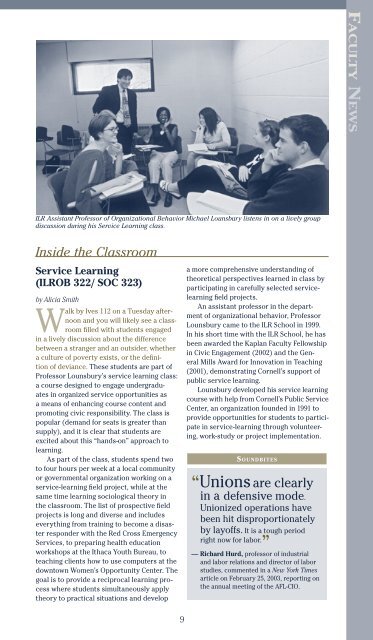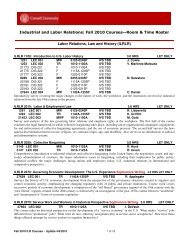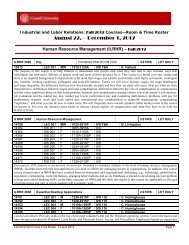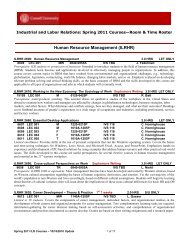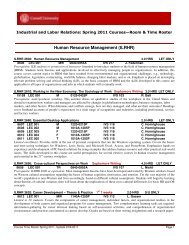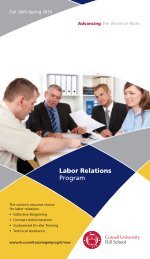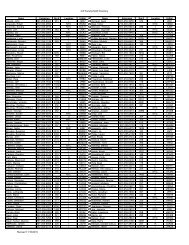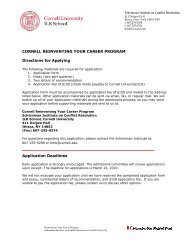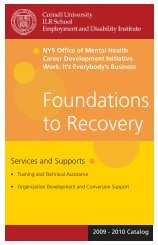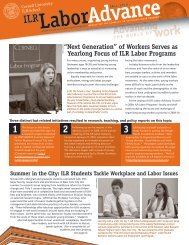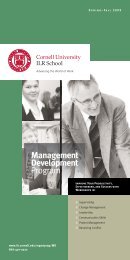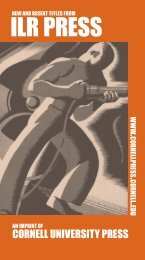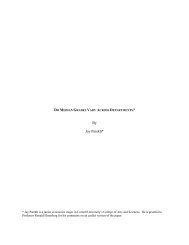Download - ILR School - Cornell University
Download - ILR School - Cornell University
Download - ILR School - Cornell University
Create successful ePaper yourself
Turn your PDF publications into a flip-book with our unique Google optimized e-Paper software.
FACULTY NEWS<br />
<strong>ILR</strong> Assistant Professor of Organizational Behavior Michael Lounsbury listens in on a lively group<br />
discussion during his Service Learning class.<br />
Inside the Classroom<br />
Service Learning<br />
(<strong>ILR</strong>OB 322/ SOC 323)<br />
by Alicia Smith<br />
Walk by Ives 112 on a Tuesday afternoon<br />
and you will likely see a classroom<br />
filled with students engaged<br />
in a lively discussion about the difference<br />
between a stranger and an outsider, whether<br />
a culture of poverty exists, or the definition<br />
of deviance. These students are part of<br />
Professor Lounsbury’s service learning class:<br />
a course designed to engage undergraduates<br />
in organized service opportunities as<br />
a means of enhancing course content and<br />
promoting civic responsibility. The class is<br />
popular (demand for seats is greater than<br />
supply), and it is clear that students are<br />
excited about this “hands-on” approach to<br />
learning.<br />
As part of the class, students spend two<br />
to four hours per week at a local community<br />
or governmental organization working on a<br />
service-learning field project, while at the<br />
same time learning sociological theory in<br />
the classroom. The list of prospective field<br />
projects is long and diverse and includes<br />
everything from training to become a disaster<br />
responder with the Red Cross Emergency<br />
Services, to preparing health education<br />
workshops at the Ithaca Youth Bureau, to<br />
teaching clients how to use computers at the<br />
downtown Women’s Opportunity Center. The<br />
goal is to provide a reciprocal learning process<br />
where students simultaneously apply<br />
theory to practical situations and develop<br />
a more comprehensive understanding of<br />
theoretical perspectives learned in class by<br />
participating in carefully selected servicelearning<br />
field projects.<br />
An assistant professor in the department<br />
of organizational behavior, Professor<br />
Lounsbury came to the <strong>ILR</strong> <strong>School</strong> in 1999.<br />
In his short time with the <strong>ILR</strong> <strong>School</strong>, he has<br />
been awarded the Kaplan Faculty Fellowship<br />
in Civic Engagement (2002) and the General<br />
Mills Award for Innovation in Teaching<br />
(2001), demonstrating <strong>Cornell</strong>’s support of<br />
public service learning.<br />
Lounsbury developed his service learning<br />
course with help from <strong>Cornell</strong>’s Public Service<br />
Center, an organization founded in 1991 to<br />
provide opportunities for students to participate<br />
in service-learning through volunteering,<br />
work-study or project implementation.<br />
S O U N D B I T E S<br />
“Unions are clearly<br />
in a defensive mode.<br />
Unionized operations have<br />
been hit disproportionately<br />
by layoffs. It is a tough period<br />
right now for labor. ”<br />
— Richard Hurd, professor of industrial<br />
and labor relations and director of labor<br />
studies, commented in a New York Times<br />
article on February 25, 2003, reporting on<br />
the annual meeting of the AFL-CIO.<br />
9


